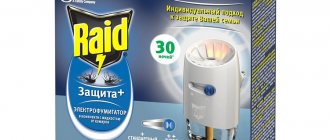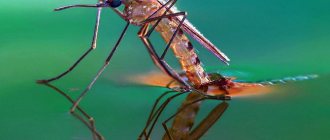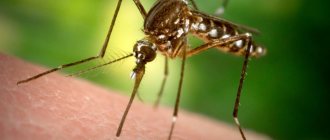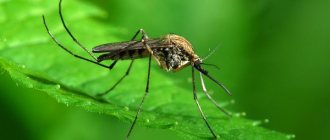Summer is coming, the season of hiking and fishing begins, and many are faced with the problem of vicious insects, mosquitoes. These are annoying insects that bite quite painfully and cause itching and burning.
In many countries, they are carriers of dangerous diseases such as malaria, Zika fever, yellow fever and other parasitic diseases, fortunately in Russia they are not so dangerous, although there are dangerous species, they are still annoying and spoil outdoor recreation.
There are many ways to protect yourself from them, let's figure out how.
Mosquitoes in Russia and the world
There are about three thousand species in the world, more than a hundred species live in Russia.
The following types are common in Russia:
- Squeak mosquito, common, Culex - found everywhere, transmits meningitis, Japanese encephalitis, belongs to real mosquitoes, found in the Krasnodar region;
- The yellow fever mosquito, Aedes aegypti, transmits yellow fever, Zika virus, and Dengue fever. In Russia it is found in the southern regions;
- A true mosquito, Culiseta - carries many diseases, such as: West Nile fever, Japanese encephalitis, filariasis, malaria, St. Louis encephalitis. The squeak mosquito is mainly widespread in the Russian Federation.
- Anopheles messeae - carries malaria. It is found in the south and central part of the country, in the Urals and Western Siberia. In the Far East.
Although they can all carry various diseases, this does not mean that they carry it, since this disease may be absent in the territory where they live, and in the Russian Federation they are extremely rare due to the cold climate, mainly rare cases of diseases are found in the southern regions of the country. Don’t be afraid of every mosquito you see that bites you and immediately run to the hospital for examination.
Mosquito habitats include stagnant bodies of water, marshy shores, forests and meadows. Rain and high humidity favor their appearance, as they like to lay their eggs in puddles.
Big puddle
The natural enemies of mosquitoes are various aquatic insects, fish and amphibians. But they live in bodies of water, so there are always more mosquitoes in forests and wetlands.
We recommend: Perch: characteristics, habits and features of searching in a reservoir
They are usually active in the evening.
Female mosquitoes bite; when they bite, they inject poison, such as histamine and others, which causes itching and burning after the bite.
Rarely, and in a limited group of people with allergies, it can cause anaphylactic shock, but in most cases, the consequences of a bite do not cause symptoms other than itching.
Male mosquitoes are harmless and do not bite; they feed on pollen.
The life cycle of a mosquito is short and lasts up to several weeks.
The female mosquito uses blood to produce her eggs due to its high protein and other nutritional content. After laying eggs, the female dies. In rare cases, if she manages to replenish her blood supply, she can carry out a second clutch.
Methods for controlling mosquitoes while camping, fishing and outdoor recreation.
When searching for prey, mosquitoes use some kind of infrared sensor; they easily detect objects that have a body temperature higher than the environment and emit carbon dioxide.
One of the methods of struggle is to choose the right place to camp your camp:
- Mosquitoes do not resist wind well and are easily blown away. Choose a ventilated place.
- Choose places where there is no tall grass, standing puddles or wetlands.
Perhaps you shouldn’t insert it near the edge of the bank, it’s better to move 7-15 meters away from it, perhaps there will be fewer mosquitoes in such places.
Technologies in the fight against mosquitoes:
To combat mosquitoes in the camp, there are several methods, commercially produced repellents, and folk remedies, let’s look at them in order.
- Anti-mosquito coils are placed around the camp and set on fire; when the coil smolders, acrid smoke is released and repels mosquitoes. Works effectively if installed correctly on the downwind side. But the downside is the unpleasant smell, which causes discomfort and unpleasant sensations for some. There is a fire hazard when used in dry coniferous forests, and if there is dry grass, it is necessary to constantly monitor them.
- Gasoline heating pad-fumigator. It is a catalytic gasoline hand warmer, with a special nozzle into which plates for the fumigator are installed. The thing is especially effective if it is on the belt, and is more suitable for fishermen. However, it can also be used in a camp; the number of mosquitoes is noticeably reduced. You can warm your hands, put it in your pocket, or dry wet shoes. Fireproof, the smell and harm are a little lighter than mosquito coils, but can also cause discomfort. The downside is that you need to take special gasoline with you.
- Portable fumigators - the principle of operation is the same as that of a gasoline fumigator heating pad; similar plates are used. Instead of gasoline, they use batteries or accumulators, this is the main disadvantage, due to which their weight and dimensions increase. It is similar in efficiency to heating pads, or more powerful if several plates are used.
We recommend: Asp, where to look, how to catch
Anti-mosquito electronics
Folk fumigators
The fire is probably the most accessible and effective method.
Mosquitoes do not like the smell of smoke; after a couple of days, your clothes and body become saturated with the smell of a fire and mosquitoes cease to be interested in you.
You can put pine cones or birch tinder fungus on the ashes in the fire so that they smolder and not burn, the smell and smoke released are good at driving away insects.
You can cut the birch polypore into plates, dry them a little and use them in the same way as spirals. Efficiency varies, but there are indeed noticeably fewer mosquitoes; on average, the plate lasts for 10-15 minutes.
A plate of dry tinder fungus must be fixed and set on fire; mosquitoes are afraid of smoke and do not fly up.
My personal experience
During my work on the expedition, everything was checked - mosquitoes adored me with passion and still adore me to this day! And in the heat, when the sweat was rolling in hail, a whole swarm surrounded me. I couldn’t use any synthetic repellents - my allergy to them was worse than that of mosquitoes!
But I found a solution and have been using it for several decades. I'll tell you about some of my methods against mosquitoes.
1. The fastest and easiest mosquito repellent is vinegar water. Dilute 9% vinegar with water (1 portion of vinegar + 2 portions of water), and spread it all over yourself - not just the exposed parts. By the way, it is very good for the skin, maintains an acidic pH.
You can use trial and error to find the optimal concentration for yourself, as some are diluted in a 1:1 ratio. If the skin is dry, add a few drops of any vegetable oil. But it’s better without it - then the pores don’t get clogged and you sweat normally, which is necessary for thermoregulation of the body.
2. The most effective mosquito repellent in the bedroom , which also improves sleep, is my know-how:
Pour plain water into a flat small plate (I take a dessert plate), pour half a bag of cloves and add a teaspoon of valerian alcohol tincture (pharmaceutical). The mosquito scarecrow is ready!
I put the plate on the nightstand at the head of the bed - and I can directly hear the indignation of the hungry mosquitoes! The mosquitoes fly around a little - about 5 minutes - and disappear somewhere. Sleep soundly and calmly - even in winter, when there are no mosquitoes, you can do this “inhalation” for yourself...
A small nuance - as it evaporates, add water and add valerian every day - it disappears within a day.
Also remember about personal hygiene - the less the smell of sweat, the more indifferent mosquitoes are to you .
Personal mosquito repellent
Creams and repellents
There are many different creams and repellents sold against both mosquitoes and ticks. You need to select it individually. They act quite effectively and in different ways.
There are those that are applied to the skin or clothing, read the instructions before use.
They can cause various allergic reactions, discomfort and unpleasant sensations. If it comes into contact with plastic objects, it may cause them to collapse. They often have an unpleasant odor.
We recommend reading the article: How to prepare mosquito repellent at home
mosquito net
The most effective product can be used either on a cap or hat, or for installation in an awning or tent. Mosquitoes will fly in a circle, but will not be able to bite. The main disadvantage is that it is not convenient in many situations.
Separately, use loose clothing made of thick fabric that mosquitoes cannot bite through.
There is no point in using various traps in nature; they are not effective in open space, but they are large in size and weight.
Folk repellents
Black peppercorns
It contains the alkaloid piperine, which gives pepper its unique taste; it is also used in the production of repellents, and mosquitoes really dislike it. You can scatter peas in your pockets, this way your smell will be masked and mosquitoes will no longer be interested in you. The method is not suitable for everyone; it can cause discomfort, skin irritation and other minor inconveniences.
Garlic
You need to eat a couple of cloves of garlic, it contains allicin, which changes the smell of your body. You will not be pleasant to mosquitoes, which is probably where the belief that garlic helps against vampires comes from.
There is no point in rubbing yourself with garlic; it quickly evaporates and stops working.
Apple vinegar
Mix in equal proportions with water and pour into a vessel with a spray bottle. It works for quite a long time, but the smell is not for everyone. You can add some essential oil.
Peppermint
You need to boil half a glass of water and brew a strong infusion in it. It is necessary to rub with a cold solution. Doesn't last long.
Vanilla
You need to make a concentrated solution, treat clothes and skin. It smells nice and lasts long enough, but make sure you are not allergic to it.
Lavender oil
Mosquitoes do not like the smell of lavender; you need to make a solution from the oil by diluting it in distilled water. You can soak the leaves, both fresh and dry, and make an aqueous solution; it works worse, but is quite effective.
Tea tree oil
It is used like lavender oil, but has a number of benefits, such as antiseptic, antimicrobial and anti-inflammatory properties. Suitable for treating and relieving itching after bites.
Asian tiger balm, star and others
They contain eucalyptus and work effectively against mosquitoes, but they have a strong, specific odor that may not appeal to everyone and can cause a burning sensation on the skin.
Tar
A method for extreme sports enthusiasts and survivalists, you must first extract it from birch bark and clean it of soot. It works effectively, but it leaves your face and hands dirty.
Gun oil
Gun oils are made on the basis of natural ingredients, they have a hypoallergenic composition and a pungent odor to which animals do not react, but they repel mosquitoes well.
Unconfirmed methods
Some believe that supplemental intake of vitamin B1 changes the odor produced by the body, as a result of which mosquitoes are not interested in humans. The method is questionable, we are writing for information only, and do not forget that additional vitamins can only be taken as prescribed by a doctor.
Candles with citronella
Citronella is a tropical herbaceous plant with a spicy lemon aroma.
– There is very little evidence that such a candle will protect against mosquitoes. It is more likely to fill the space with a pleasant smell, says Immo Hansen.
Perhaps such candles are still capable of having some kind of repellent effect on insects, but they will not be able to provide complete protection.
Thus, a study from New Mexico State University reported that a candle with citronella showed no effect compared to products with DEET. But in the study
biologists from the University of Guelph (Canada), citronella candles showed some effectiveness, although they did not provide complete protection. So, eight volunteers divided into four groups of two people and went out into the field: the first group had a candle with citronella, the second had citronella incense. The third came out with a very ordinary candle (what if mosquitoes are repelled not by the smell, but by the flame?), the fourth did not have any means of protection.
Those with a citronella candle received an average of six bites, incense – eight, a regular candle – also eight, and the last group received about ten bites.











